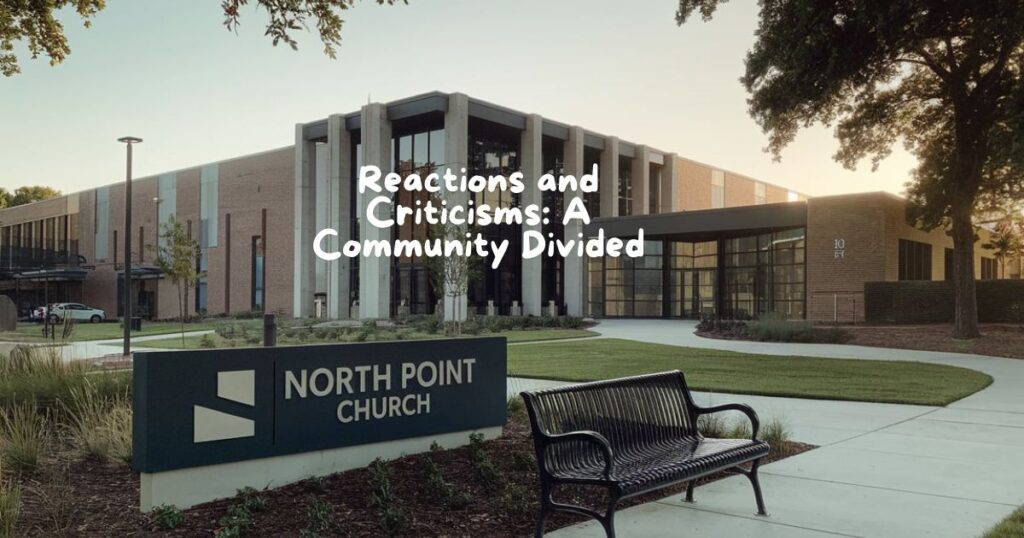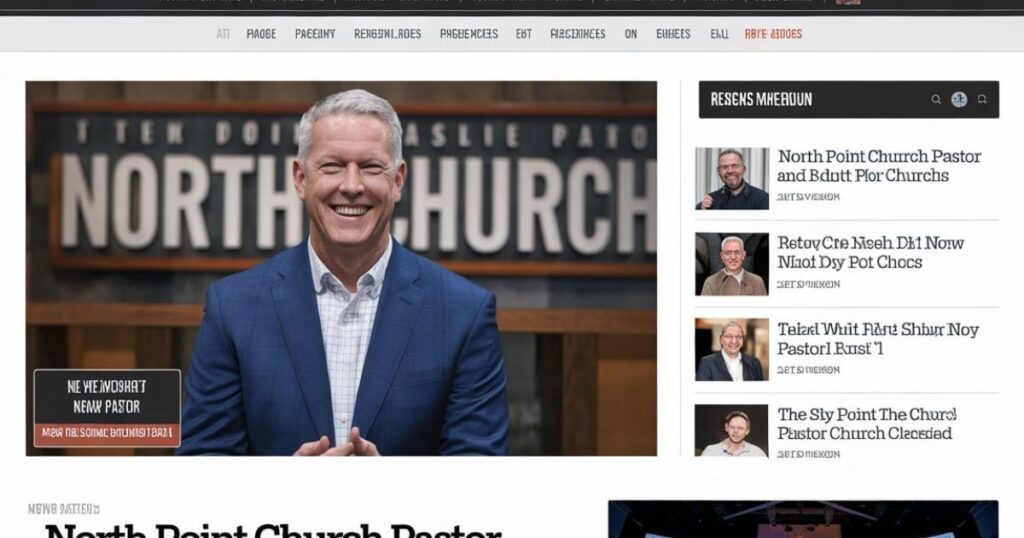In a shocking turn of events that has sent ripples through the Christian community, Andy Stanley, the charismatic leader of North Point Community Church, has stepped down from his position.
This unexpected resignation has left many wondering about the circumstances surrounding his departure and its implications for one of America’s most influential megachurches.
Let’s dive deep into the full story, exploring the events that led to this moment and what it means for the future of North Point Church and modern Christianity.
Introduction: A Seismic Shift in Atlanta’s Religious Landscape
On a quiet Sunday morning in May, the congregation of North Point Community Church was stunned into silence. Their beloved pastor, Andy Stanley, stood before them not to deliver his usual thought-provoking sermon, but to announce his resignation.
This moment marked the end of an era for one of the most progressive and fastest-growing churches in the United States.
Stanley’s departure isn’t just a local church matter; it’s a story that touches on the broader challenges facing modern Christianity in America.
From controversies over doctrine to struggles with changing societal norms, the resignation of this influential pastor offers a window into the complex world of megachurch leadership in the 21st century.
Background of Andy Stanley: The Rise of a Christian Visionary

To understand the weight of Stanley’s resignation, we must first look at his remarkable journey to becoming one of America’s most influential pastors.
- Born in 1958, Andy Stanley grew up in a Christian household
- Son of Dr. Charles Stanley, another well-known Baptist minister
- Graduated from Georgia State University and Dallas Theological Seminary
- Founded North Point Community Church in 1995
Under Stanley’s leadership, North Point Community Church grew from a small startup to a multi-campus megachurch with over 38,000 weekly attendees.
His engaging speaking style and practical approach to Christianity resonated with many, especially younger generations seeking a more modern interpretation of faith.
“Andy Stanley didn’t just build a church; he pioneered a new way of doing church in America,” says Dr. James Parker, Professor of Religious Studies at Emory University.
Stanley’s influence extended far beyond the walls of North Point. His books, podcasts, and speaking engagements reached millions worldwide, cementing his status as a thought leader in contemporary Christianity.
Read this Post: Minecraft: Bedrock Edition (2011) Game Icons Banners
The Sermon That Sparked Controversy: When Gracie Met Truthy
The events leading to Stanley’s resignation can be traced back to a seemingly innocuous sermon series titled “When Gracie Met Truthy.” On April 15, 2024, Stanley delivered a sermon that would unknowingly become the catalyst for his departure.
In this controversial message, Stanley used a narrative involving a married couple to illustrate the complex interplay between grace and truth in Christian teachings.
The story involved a wife discovering her husband’s involvement with another man, a scenario Stanley used to explore how Christians might navigate such sensitive situations with both compassion and adherence to biblical principles.
Key points from the sermon:
- Emphasized the importance of showing grace in difficult situations
- Discussed the challenges of balancing traditional doctrine with modern realities
- Called for a more nuanced approach to addressing LGBTQ+ issues in the church
While Stanley’s intent was to foster understanding and dialogue, the sermon’s content and framing quickly became a lightning rod for controversy.
Reactions and Criticisms: A Community Divided

The aftermath of Stanley’s sermon was swift and polarizing. Within days, Christian leaders and laypeople alike were engaged in heated debates about the implications of Stanley’s message.
R. Albert Mohler Jr., President of the Southern Baptist Theological Seminary, penned a scathing critique of Stanley’s sermon. In a widely-shared blog post, Mohler accused Stanley of normalizing homosexual relationships and straying from biblical teachings.
“Andy Stanley’s approach, while well-intentioned, risks undermining the clear moral teachings of scripture,” Mohler wrote. “In our desire to show love, we must not compromise on truth.”
The reaction within the Christian community was mixed:
| Supporters | Critics |
| Praised Stanley’s compassionate approach | Accused Stanley of compromising biblical values |
| Appreciated addressing complex modern issues | Feared a slippery slope towards doctrinal erosion |
| Saw it as necessary evolution of church teaching | Viewed it as capitulation to secular culture |
Social media exploded with discussions, hashtags like #StandWithAndy and #BiblicalTruthMatters trending as people weighed in on the controversy.
The Resignation Announcement: A Church in Shock
On May 1, 2024, just weeks after the controversial sermon, Andy Stanley stood before his congregation to deliver news that few saw coming.
In a heartfelt address, Stanley announced his resignation as senior pastor of North Point Community Church.
Excerpts from Stanley’s resignation speech:
- “After much prayer and reflection, I believe it’s time for me to step aside.”
- “This decision is not made lightly, but with a deep conviction that it’s the right thing for me and for North Point.”
- “I’m grateful for the years we’ve shared and the work we’ve done together.”
Stanley cited personal reasons and a desire to explore new opportunities as the primary motivators for his departure. However, speculation ran rampant about the true reasons behind his sudden exit.
Internal Conflicts and Leadership Struggles: Behind Closed Doors

As the dust settled from Stanley’s announcement, reports began to emerge of long-standing tensions within North Point’s leadership structure.
Sources close to the church revealed that Stanley’s controversial sermon was merely the tipping point in a series of disagreements over the church’s direction.
Key areas of conflict included:
- Doctrinal disagreements: Debates over how to interpret and apply biblical teachings in modern contexts
- Political stances: Differing views on the church’s role in addressing social and political issues
- Financial management: Questions about resource allocation and expansion strategies
- Leadership style: Concerns about Stanley’s increasingly progressive approach
These internal struggles had reportedly been simmering for months, if not years, creating a strained environment that made Stanley’s position increasingly untenable.
Read this Post: Wallpaper:znvmimg_hwe= Stitch: Elevate Your Home with Textured Elegance
Impact on North Point Community Church: Navigating Uncertain Waters
The resignation of Andy Stanley left North Point Community Church reeling. For many members, Stanley was more than just a pastor; he was the face and voice of their faith community.
In the immediate aftermath, church leadership scrambled to maintain stability:
- Appointed an interim leadership team
- Held town hall meetings to address congregational concerns
- Launched a counseling program to support members struggling with the transition
Despite these efforts, the church faced significant challenges:
- Attendance fluctuations: Some members left, while others joined out of curiosity
- Financial implications: Concerns about potential drops in donations and funding for ongoing projects
- Identity crisis: Questions about the church’s future direction and doctrinal stance
Broader Implications for Modern Christianity: A Watershed Moment
Andy Stanley’s resignation from North Point Church is more than just a local church story; it’s a reflection of the broader challenges facing modern Christianity in America.
Key issues highlighted by this event:
- Progressive vs. Traditional divide: The ongoing tension between adapting to societal changes and maintaining traditional doctrines
- Megachurch dynamics: The unique pressures and scrutiny faced by high-profile pastors and large congregations
- Social issues in the church: The struggle to address controversial topics like LGBTQ+ rights within a Christian framework
- Leadership succession: The challenges of transitioning from a founder-led model to new leadership
This event has sparked conversations in churches across the country, forcing many to reevaluate their own stances on controversial issues and leadership structures.
The Path Forward: Rebuilding and Reimagining

As North Point Community Church looks to the future, it faces the daunting task of charting a new course without its founding pastor.
The church’s next steps will be crucial in determining its long-term viability and impact.
Key focus areas for North Point’s future:
- Leadership search: Finding a new senior pastor who can balance the church’s established culture with necessary changes
- Doctrinal clarity: Establishing a clear stance on controversial issues to provide direction for the congregation
- Community healing: Implementing programs to address divisions and rebuild trust within the church body
- Vision casting: Developing a compelling vision for the church’s future that honors its past while embracing new realities
The success of these efforts will not only shape the future of North Point but could also serve as a case study for other churches facing similar challenges.
Conclusion: Lessons from a Church in Transition
The resignation of Andy Stanley from North Point Church serves as a powerful reminder of the complex challenges facing modern Christian leaders. It highlights the delicate balance between adhering to traditional beliefs and addressing the realities of a changing world.
As North Point navigates this transition, its journey offers valuable insights for churches across America grappling with similar issues. The coming months and years will be crucial in determining whether this moment of crisis becomes an opportunity for growth and renewal or the beginning of a decline.
Regardless of the outcome, Andy Stanley’s departure from North Point Church marks a significant moment in American Christianity—one that will likely be studied and discussed for years to come.
FAQ’s
Why are pastors leaving the church?
Pastoral resignations have become increasingly common in recent years, driven by a variety of factors:
- Cultural shifts: Rapidly changing societal norms create tension with traditional church teachings
- Burnout: The demands of modern ministry can lead to mental and emotional exhaustion
- Doctrinal disagreements: Evolving personal beliefs may conflict with church doctrine
- Scandals: Moral failures or abuse allegations can force pastoral departures
- Financial pressures: Declining church attendance can lead to budget cuts and job insecurity
What pastor recently resigned?
While Andy Stanley’s resignation from North Point Church is the focus of this article, several other high-profile pastors have also stepped down in recent years:
- Carl Lentz from Hillsong NYC (2020)
- John Ortberg from Menlo Church (2020)
- Bill Hybels from Willow Creek Community Church (2018)
Each of these resignations came with its own set of circumstances and controversies, reflecting the diverse challenges facing modern church leadership.
What to do when a pastor resigns?
When a pastor resigns, churches should focus on:
- Transparent communication: Keep the congregation informed about the transition process
- Emotional support: Provide counseling and support groups for members struggling with the change
- Maintain operations: Ensure that regular church activities and ministries continue uninterrupted
- Leadership transition: Develop a clear plan for interim leadership and the search for a new pastor
- Reflect and learn: Use the transition as an opportunity to evaluate the church’s mission and practices
What happened to the megachurch pastor?
In the case of Andy Stanley, the megachurch pastor resigned from his position at North Point Community Church following a controversial sermon and reported internal conflicts.
While the full details of his departure remain private, the event has sparked widespread discussion about the challenges of leading large churches in today’s complex social and religious landscape.
As of now, Stanley’s future plans remain unclear, but his influence on modern Christianity is likely to continue in some form, whether through writing, speaking engagements, or new ministry endeavors.
The story of Andy Stanley and North Point Church serves as a compelling case study in the evolving nature of Christian leadership and the ongoing dialogue between traditional faith and contemporary culture.

Hello, I’m Matthew, an author at GenRealRedar, where I explore the dynamic worlds of Lifestyle, Tech, Gaming, and Travel. My articles are designed to offer insightful and engaging content, breaking down complex topics into easily digestible reads for a broad audience. Stay tuned on GenRealRedar.com for fresh perspectives and the latest updates on all things tech, lifestyle, and beyond.

